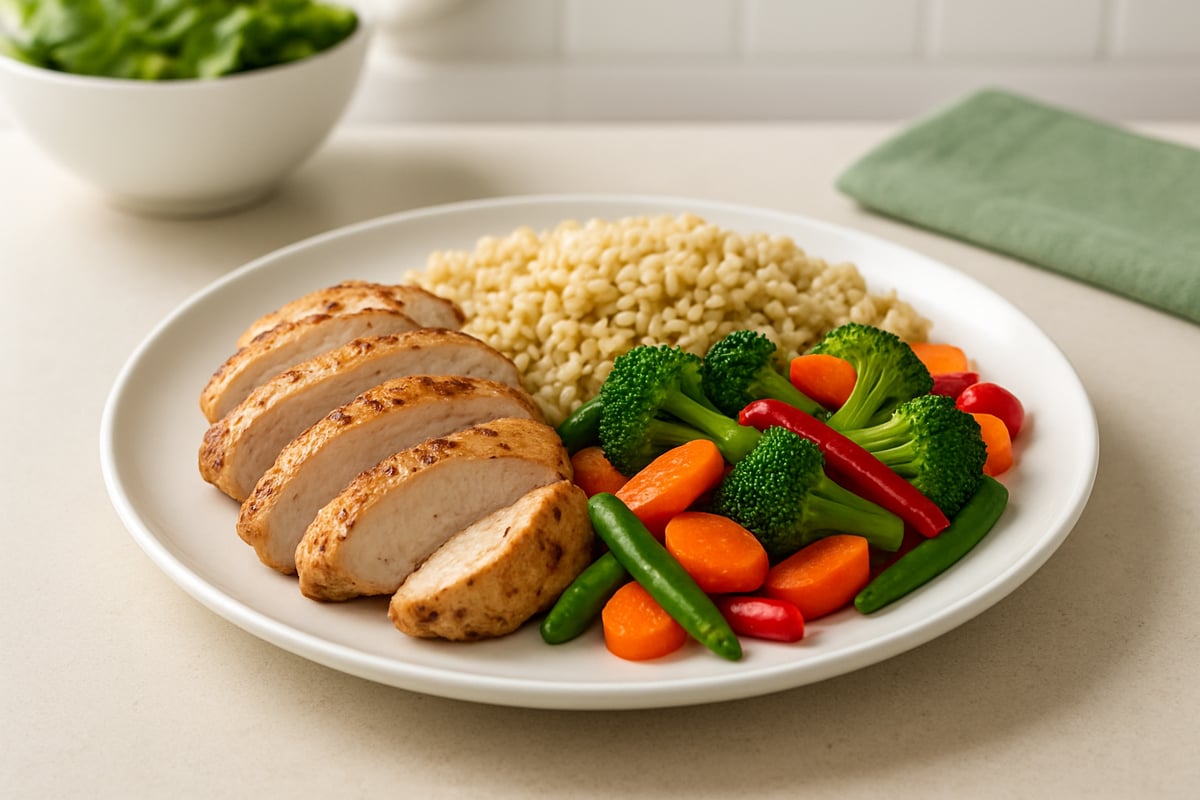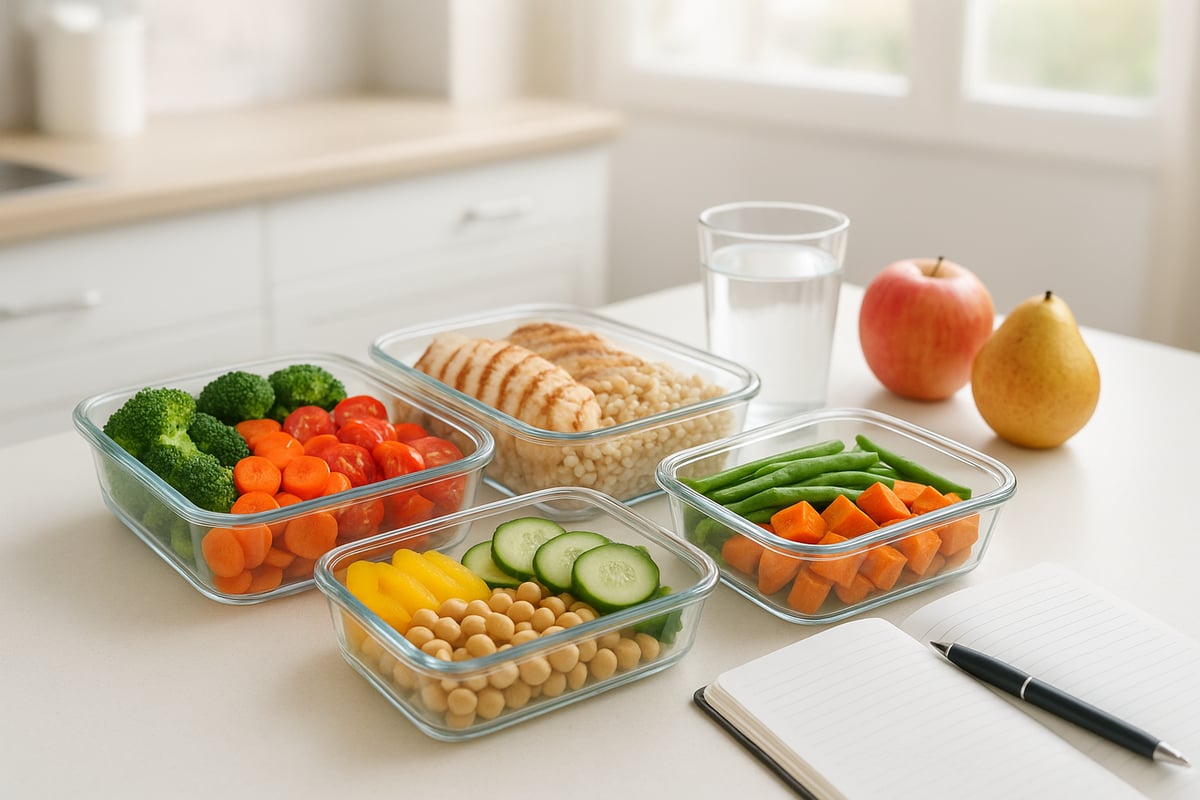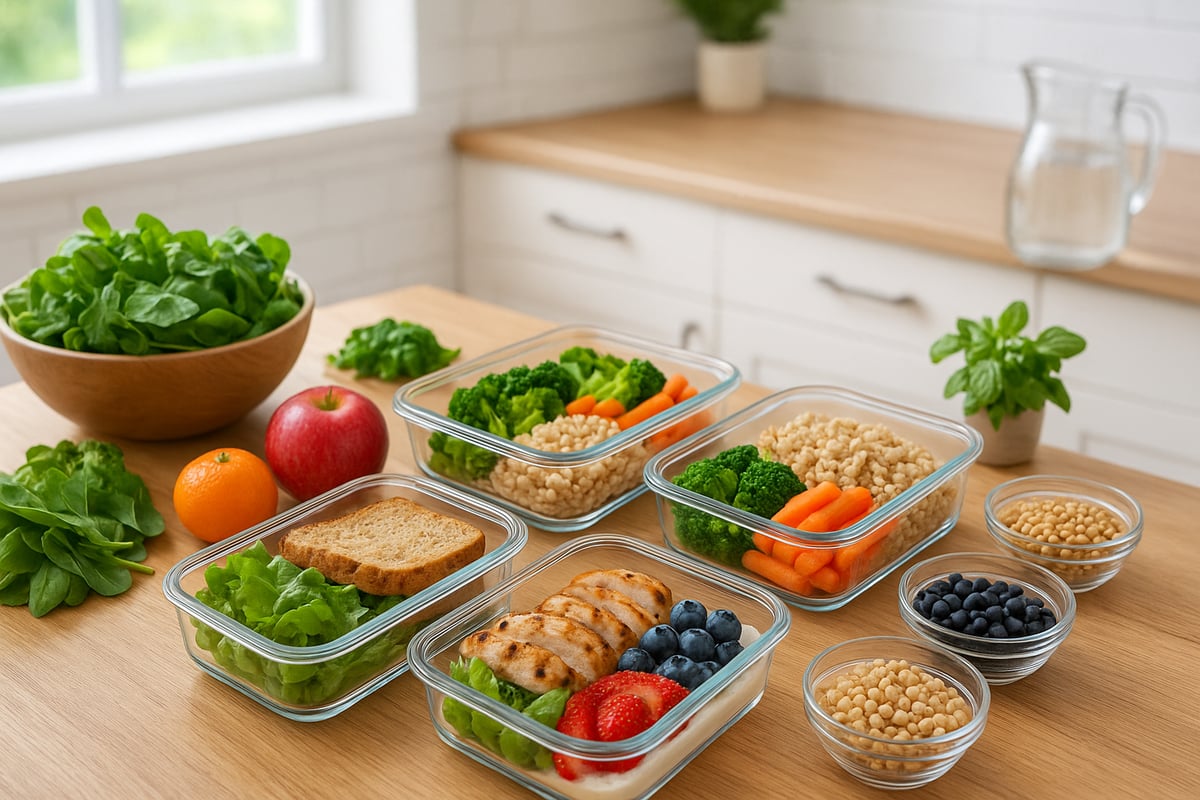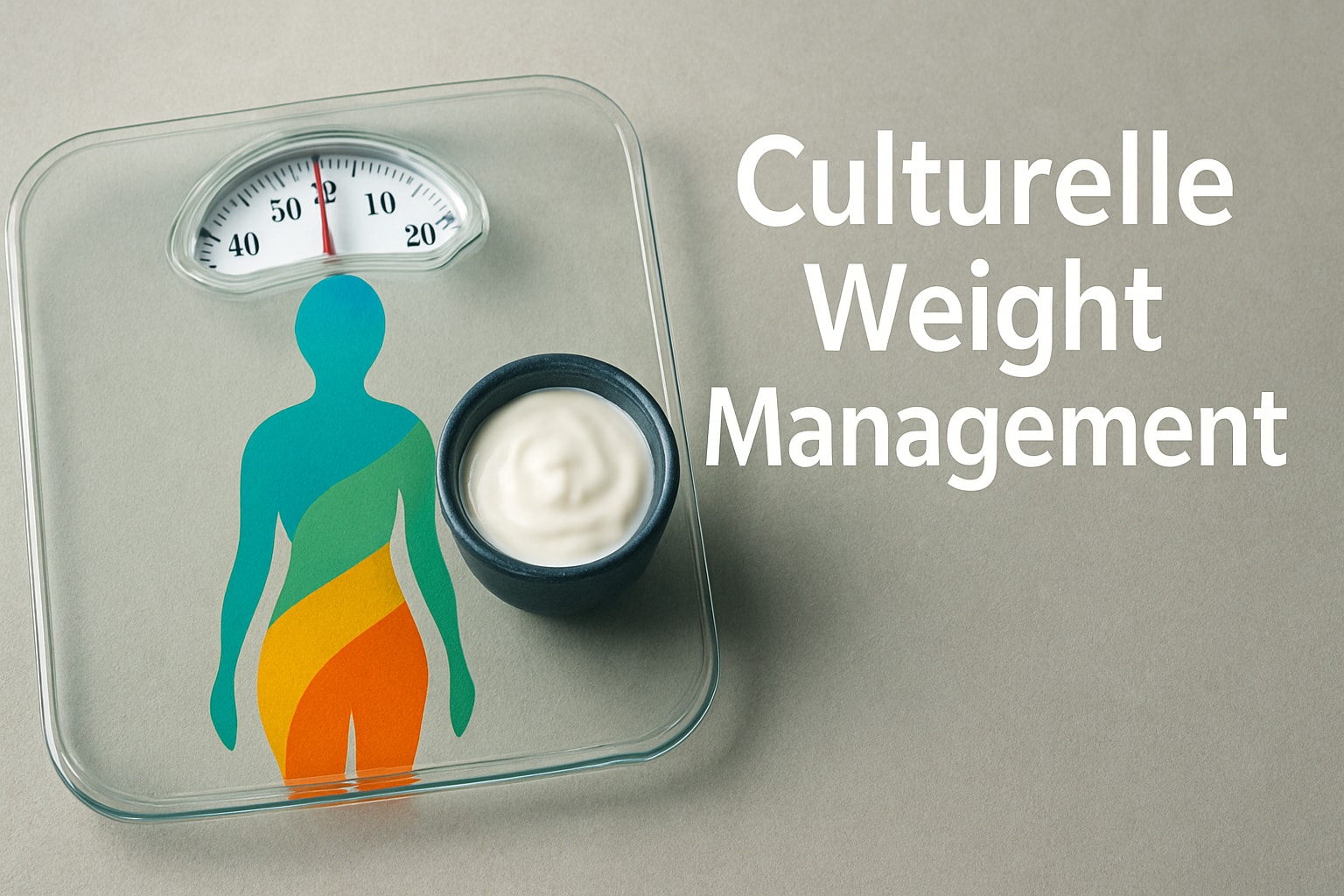Struggling to shed pounds or manage your nutrition in 2025? You are not alone. Many people face challenges with weight loss and healthy eating, even with the wealth of resources available today.
That is why 1200 calorie meal plans have gained attention as a structured, science-backed solution. This essential guide demystifies the concept, revealing how these plans can support sustainable weight management and improved health.
Inside, you will discover expert advice, practical steps, customizable menus, and up-to-date strategies tailored for 2025. Ready to take control of your health? Explore our comprehensive approach, or dive deeper into topics like mindful eating, craving management, and building lifelong habits.
Understanding the 1200 Calorie Meal Plan
Choosing the right approach to nutrition can feel overwhelming, especially with so many options available in 2025. 1200 calorie meal plans have become a popular choice for those seeking a structured, science-backed method for weight management. Let’s break down what these plans involve, who they’re suited for, their benefits and risks, and the latest research to support your journey.

What is a 1200 Calorie Meal Plan?
A 1200 calorie meal plan is a calorie-restricted eating pattern designed to help individuals create a calorie deficit for weight loss. It typically involves consuming only 1200 calories per day, divided among balanced meals and snacks.
Historically, 1200 calorie meal plans have been used in clinical and weight management settings due to their simplicity and measurable results. Today, they align with modern trends emphasizing portion control, whole foods, and mindful eating.
Unlike other restrictive diets, 1200 calorie meal plans focus on nutrient density rather than exclusion. A typical day includes:
- Lean proteins (chicken, fish, tofu)
- Whole grains (brown rice, quinoa)
- Colorful vegetables
- Fruits in moderation
- Healthy fats (avocado, nuts, olive oil)
By limiting calories but prioritizing nutrition, these plans offer a structured path to weight loss that fits today’s evidence-based recommendations.
Who is the 1200 Calorie Meal Plan For?
1200 calorie meal plans are best suited for adults aiming for weight loss, particularly those with a lower daily energy requirement. Healthcare providers may recommend this approach for individuals with type 2 diabetes, pre-diabetes, or metabolic syndrome, as calorie control can support blood sugar management.
However, these plans are not appropriate for everyone. They are not suitable for:
- Children and teenagers
- Pregnant or breastfeeding women
- Highly active individuals or athletes
Medical supervision is crucial when starting 1200 calorie meal plans, especially for people managing chronic conditions. Diabetes UK emphasizes that individual needs vary, and professional support helps ensure safety and effectiveness.
If you’re considering this approach, consult a registered dietitian or medical provider to tailor the plan to your health profile.
Health Benefits and Potential Risks
1200 calorie meal plans can deliver significant health benefits when properly managed. Research shows that participants following these plans often achieve steady weight loss, with many losing up to 1-2 pounds per week.
Benefits include:
- Improved blood sugar control
- Reduced cholesterol levels
- Enhanced metabolic health
However, there are potential risks if the plan is not carefully structured:
- Fatigue and low energy
- Nutrient deficiencies (iron, calcium, B vitamins)
- Slowed metabolism if calorie intake is too low for your needs
It’s essential to prioritize nutrient-dense foods and monitor your health regularly. Balanced nutrition and ongoing support from professionals help prevent negative side effects and maintain long-term success.
Scientific Basis and 2025 Updates
Recent studies reinforce the effectiveness of calorie restriction for weight management and metabolic health. The 2025 dietary guidelines stress the importance of nutrient quality, even with reduced calorie intake. Evidence points to the sustainability of 1200 calorie meal plans when meals are balanced and individualized.
Key elements include:
- Adequate protein for muscle preservation
- Sufficient fiber and healthy fats
- Inclusion of whole grains and vegetables
For up-to-date recommendations, refer to the 2020–2025 Dietary Guidelines for Americans, which outline calorie needs, food group targets, and tips for building a healthy eating pattern.
Insights from organizations like Diabetes UK and top nutritionists highlight the need for personalization to maximize results and minimize risks.
Common Myths and Misconceptions
There are several myths about 1200 calorie meal plans that can create confusion. One common misconception is the idea of "starvation mode," where the body supposedly stops burning fat. In reality, while metabolism may slow slightly, safe calorie reduction with balanced nutrition remains effective.
Other myths include:
- Believing rapid weight loss is always healthy
- Assuming constant hunger is inevitable
- Thinking this plan is suitable for everyone
Realistically, hunger can be managed by choosing high-volume, low-calorie foods and spacing meals throughout the day. Remember, 1200 calorie meal plans are not one-size-fits-all, and results depend on your individual needs and adherence to professional guidance.
How to Start a 1200 Calorie Meal Plan: Step-by-Step
Beginning 1200 calorie meal plans is a process that requires thoughtful preparation and a strategic mindset. By following these clear steps, you set yourself up for sustainable weight management and a healthier lifestyle. Let’s break down the journey into actionable stages so you can move forward with confidence.

Assess Your Readiness and Set Goals
Before diving into 1200 calorie meal plans, evaluate your current health status and motivation. Are you ready to commit to structured eating? Consult a healthcare provider to ensure this plan suits your needs, especially if you have any medical conditions. Setting clear, measurable goals is essential—think about your target weight, energy levels, or even how your clothes fit.
Track your progress by recording your weight, measurements, and how you feel daily. Adopting the right mindset is crucial for long-term success. For guidance grounded in science and professional expertise, explore this dietitian-approved weight loss advice. Remember, being honest with yourself at this stage will lead to better results.
Plan Your Meals and Shop Smart
Effective 1200 calorie meal plans begin with smart meal planning. Outline your meals for the week, including breakfast, lunch, dinner, and snacks. Create a balanced shopping list filled with whole foods like vegetables, fruits, lean proteins, and whole grains.
When in the store, read nutrition labels to make informed choices. Choose unprocessed foods when possible, as they offer better nutrition for fewer calories. If you are on a budget, buy in bulk, opt for seasonal produce, and look for sales. Consistent planning helps you stay on track and avoid last-minute temptations.
Portion Control and Calorie Counting Tips
Mastering portion control is vital for 1200 calorie meal plans. Familiarize yourself with standard serving sizes—use measuring cups, food scales, or visual cues like the size of your palm or fist. Tracking calories can be simplified with apps or food diaries.
Be aware of hidden calories in dressings, sauces, and snacks. Break down your plate: fill half with non-starchy vegetables, a quarter with lean protein, and a quarter with whole grains. This visual approach keeps your portions in check and supports your calorie goals.
Building Sustainable Habits for Success
Long-term success with 1200 calorie meal plans depends on building habits that fit your lifestyle. Meal prepping is a game-changer, allowing you to have healthy options ready during busy days. Social situations and eating out can be managed by reviewing menus in advance or bringing your own snacks.
Overcoming cravings and emotional eating is possible with strategies like journaling, taking progress photos, or joining support communities. If you face setbacks or plateaus, stay positive and adjust your approach rather than giving up. For more help, check out articles on managing emotional eating habits, common mistakes in weight loss, and tips for avoiding weight gain.
Monitoring Progress and Adjusting the Plan
Regular check-ins are key when following 1200 calorie meal plans. Monitor your weight, energy, and mood weekly to spot trends and make informed adjustments. If you feel fatigued or notice signs of under-eating, consider increasing your calorie intake or seeking professional advice.
Celebrate milestones, both big and small, such as fitting into an old pair of jeans or feeling more energetic. Non-scale victories are just as important as the numbers. When in doubt, return to your goals and consult with experts for ongoing support. For structured programs and more resources, visit Oneleaf weight loss program.
1200 Calorie Meal Plan Templates & Sample Menus
Looking for practical 1200 calorie meal plans you can actually stick with? These sample menus and templates offer structure, flexibility, and inspiration for every lifestyle. Whether you prefer classic, vegetarian, or diabetes-friendly options, or need allergy adaptations, this section will guide you. Explore meal prep hacks, hydration strategies, and real-world tips to help you succeed with your 1200 calorie meal plans.

Classic 1200 Calorie Meal Plan Example
A classic 1200 calorie meal plan emphasizes balance and variety. You will typically find lean proteins, whole grains, low-fat dairy, vegetables, and fruits in each day’s menu. Here is a sample day:
- Breakfast: Greek yogurt with berries and chia seeds
- Lunch: Grilled chicken breast, quinoa, steamed broccoli
- Snack: Apple with a small handful of almonds
- Dinner: Baked salmon, brown rice, roasted asparagus
This approach spreads calories evenly and supports satiety. According to the 2025 Dietary Guidelines Advisory Committee Report Affirms the Importance of Whole Grains, whole grains should be a key part of 1200 calorie meal plans. For more weight management resources, visit Oneleaf’s program.
Vegetarian 1200 Calorie Meal Plan
Vegetarian 1200 calorie meal plans prioritize plant-based proteins and nutrient-rich produce. A typical menu could include:
- Breakfast: Oatmeal with almond milk, walnuts, and banana
- Lunch: Lentil salad with mixed greens, cherry tomatoes, and feta
- Snack: Carrot sticks with hummus
- Dinner: Stir-fried tofu, brown rice, and sautéed spinach
Ensure you get enough protein and iron by rotating beans, lentils, tofu, and eggs. Explore more vegetarian strategies in this Oneleaf guide. For tailored plans, try Oneleaf’s personalized weight loss program.
1200 Calorie Meal Plan for Diabetes Management
1200 calorie meal plans can support healthy blood sugar levels when structured with low glycemic index foods and consistent carbohydrate distribution. A diabetes-friendly day might look like:
- Breakfast: Scrambled eggs with spinach and whole grain toast
- Lunch: Turkey and avocado wrap with leafy greens
- Snack: Cottage cheese with sliced peaches
- Dinner: Grilled fish, roasted sweet potatoes, green beans
Focus on fiber-rich veggies, lean protein, and healthy fats. Review Diabetes UK’s recommendations and read this article on managing blood sugar for more details. For ongoing support, consider Oneleaf’s diabetes-adapted plans.
Customizing for Dietary Preferences and Allergies
1200 calorie meal plans can be adapted for gluten-free, dairy-free, or nut-free needs. Try these swaps:
- Use quinoa or rice for gluten-free grains
- Swap dairy for oat or almond milk alternatives
- Choose sunflower seeds instead of nuts
Personalize your menu by rotating proteins and produce. For allergy-friendly recipes, see Oneleaf’s allergy guide. Stay satisfied and safe with Oneleaf’s customizable plans.
Meal Prep Ideas and Time-Saving Tips
Consistent meal prep makes sticking to 1200 calorie meal plans easier. Here are some strategies:
- Batch cook proteins like chicken or tofu for the week
- Pre-portion snacks and salads in grab-and-go containers
- Prepare freezer-friendly dinners for busy nights
- Use quick breakfast options like overnight oats
Minimize waste by planning meals around what you have. For more practical tips, check this Oneleaf article. Discover even more prep ideas with Oneleaf’s meal planning toolkit.
Hydration and Beverage Choices
Hydration is vital for appetite control and metabolism in 1200 calorie meal plans. Opt for:
- Water, sparkling water, or herbal teas
- Black coffee with no added sugar
- Fruit-infused water for variety
Limit sugary drinks and alcohol, as they add empty calories. For hydration strategies, read this Oneleaf hydration guide. Find more healthy beverage ideas in Oneleaf’s support resources.
Essential Tips for Sticking to Your 1200 Calorie Plan
Adopting 1200 calorie meal plans can be transformative, but lasting success relies on practical strategies for daily life. By focusing on satiety, flexibility, and motivation, you can navigate common obstacles and enjoy sustainable results.

Managing Hunger and Boosting Satiety
Feeling hungry on 1200 calorie meal plans is a common concern, but with the right strategies, you can stay satisfied and energized. Prioritize high-volume, low-calorie foods like leafy greens, cucumbers, and broth-based soups. These add bulk without excess calories.
Include protein and fiber in every meal to help control cravings and promote fullness. Mindful eating, such as chewing slowly and focusing on each bite, can enhance satisfaction. Try using smaller plates and bowls for better portion awareness.
Listening to your body's hunger and fullness cues is crucial. The 2020–2025 Dietary Guidelines for Americans highlight the importance of nutrient-dense choices, which align perfectly with 1200 calorie meal plans. For more on mindful eating, explore this in-depth guide from Oneleaf.
- Choose high-fiber foods
- Add lean proteins
- Drink water before meals
Eating Out, Social Events, and Travel
Maintaining 1200 calorie meal plans when dining out or traveling can be challenging, but preparation makes all the difference. Review restaurant menus in advance and opt for grilled, baked, or steamed dishes over fried options. Request dressings and sauces on the side to control added calories.
Do not hesitate to ask for substitutions, such as extra vegetables instead of fries. Packing portable snacks like fruit, nuts, or protein bars will help you avoid impulsive choices. When traveling, keep a refillable water bottle handy and plan meals around your itinerary.
For more travel tips, check out how to navigate holidays and vacations from Oneleaf. If you need a structured program for on-the-go support, visit the Oneleaf weight loss program.
- Read menus ahead of time
- Pack healthy snacks
- Stay hydrated
Overcoming Common Challenges and Plateaus
It is normal to experience plateaus or cravings while following 1200 calorie meal plans. Recognize emotional eating triggers and develop alternative coping strategies, such as journaling or breathing exercises. If weight loss stalls, reassess your activity level and meal composition.
Joining support groups or online communities can provide encouragement and accountability. Regularly reviewing your goals and progress helps maintain momentum. For deeper insight, read how to break through weight loss plateaus at Oneleaf.
You might also benefit from checking out the Oneleaf weight loss program for expert guidance and resources tailored to overcoming obstacles.
- Identify emotional triggers
- Adjust exercise routines
- Seek support from others
Meal Variety and Preventing Boredom
Sticking to 1200 calorie meal plans does not mean eating the same foods every day. Keep your meals interesting by rotating recipes, exploring global cuisines, and using fresh herbs or spices. Seasonal produce adds color and flavor while providing nutritional variety.
Try new cooking methods such as roasting, grilling, or steaming. For inspiration, browse healthy meal ideas on the Oneleaf journal. Preparing meals in advance also saves time and reduces the temptation to stray from your plan.
The Oneleaf weight loss program offers customizable meal options and creative recipes that fit various preferences.
- Rotate proteins and vegetables
- Experiment with herbs and spices
- Use seasonal ingredients
Tracking Progress and Staying Motivated
Consistent tracking is key to success with 1200 calorie meal plans. Use apps or journals to log meals, monitor weight, and record non-scale victories such as improved energy or better sleep. Set mini-goals and celebrate achievements, no matter how small.
Joining accountability groups or challenges can increase motivation. Take progress photos to visually track changes over time. If you encounter setbacks, reflect on what worked before and adjust your approach as needed. For more on building sustainable habits, read this article from Oneleaf.
Consider the Oneleaf weight loss program for additional tools and community support to keep you on track.
- Log meals and progress
- Set achievable goals
- Celebrate every milestone
Safety, Nutrition, and Long-Term Success
A safe and effective journey with 1200 calorie meal plans requires more than just calorie counting. Paying close attention to nutrition, professional guidance, activity, and mindset ensures not only weight loss but also long-term well-being. Let’s break down the essentials for lasting results.
Ensuring Nutritional Adequacy
Meeting your body’s needs is crucial when following 1200 calorie meal plans. Focus on nutrient-dense foods such as leafy greens, lean proteins, whole grains, and healthy fats. These choices maximize nutritional value without exceeding your calorie target.
Use the 2020–2025 Dietary Guidelines for Americans: What's New to Share With Clients to guide your food selection and portion sizes. This ensures you get enough vitamins and minerals, especially calcium, iron, vitamin D, and B12.
Consider a multivitamin if you struggle with variety. Watch for signs of deficiency like fatigue or hair loss, and check in with a professional if you notice symptoms. For more practical tips, see our mindful eating guide and Oneleaf’s weight loss program.
When to Seek Professional Support
Not everyone is suited to 1200 calorie meal plans on their own. If you have pre-existing health conditions, are taking medication, or experience symptoms like dizziness or mood changes, consult a registered dietitian or healthcare provider.
Receiving individualized advice can help you adapt the plan to your needs. Look for red flags such as persistent fatigue, rapid weight loss, or nutrient deficiencies. Ongoing support makes a huge difference in accountability and safety.
Explore our article on how to build healthy habits for life for additional support strategies. If you need help, Oneleaf’s program offers professional resources and personalized guidance.
Integrating Exercise with Calorie Restriction
Physical activity enhances the benefits of 1200 calorie meal plans. Choose activities that match your energy intake, such as walking, yoga, or light resistance training. Exercise helps preserve muscle mass, supports metabolism, and improves mood.
Listen to your body’s signals and adjust your workouts if you feel weak or overly fatigued. On higher activity days, you might need to slightly increase calories for recovery. Always prioritize safety and gradual progress.
Learn more about sustainable movement in our cravings management article and consider pairing exercise with Oneleaf’s weight loss program for comprehensive support.
Maintaining Results After the 1200 Calorie Plan
Transitioning off 1200 calorie meal plans is as important as starting. Gradually increase your calorie intake by adding small portions of nutrient-rich foods each week. This helps your body adjust and reduces the risk of regaining weight.
Keep tracking your meals and activity as you move into maintenance. Focus on building lifelong habits, not just short-term fixes. Celebrate milestones and monitor your health markers regularly.
Our in-depth guide to mindful eating offers actionable steps for maintenance. For a structured path, explore Oneleaf’s maintenance resources.
How Mindset and Neuroscience Support Weight Loss
Your mindset can make or break your success with 1200 calorie meal plans. Neuroscience shows that changing habits, practicing mindful eating, and managing stress are key to long-term results.
Try journaling, positive self-talk, and mindful meal rituals to reinforce new patterns. Reduce cravings by staying present, and address emotional triggers with practical tools.
Explore our article on mindset and neuroscience for science-backed strategies, or get started with the Oneleaf program for extra support.
Resources, Tools, and Further Reading
Access to the right resources can make all the difference when following 1200 calorie meal plans. Whether you are looking to track your progress, plan meals, or find expert advice, these tools will help you stay on course.
Recommended Tools and Apps for 1200 Calorie Meal Plans
- MyFitnessPal and Cronometer for calorie and nutrient tracking
- Yazio for easy meal logging and nutrition analysis
- Paprika Recipe Manager for organizing 1200 calorie meal plans and grocery lists
- PlateJoy and Eat This Much for automated meal planning
- Oneleaf weight loss program for personalized support and expert guidance
Official Guidelines and Further Reading for 2025
- USDA Dietary Guidelines 2025 for updated nutrition standards
- NHS Weight Loss Plan for evidence-based advice
- Diabetes UK guidance for diabetes-friendly 1200 calorie meal plans
- Oneleaf weight loss program for the latest behavioral and science-backed approaches
Top Oneleaf Journal Articles for Ongoing Success
- In-depth guide to mindful eating
- Science of cravings and how to manage them
- Building sustainable weight loss habits
- How to hack your brain for weight loss
- Oneleaf weight loss program for step-by-step support with 1200 calorie meal plans
Recipe Sources and Community Support
- EatingWell 1200 Calorie Meal Plans for balanced recipes
- Skinnytaste for creative, low-calorie meals
- Reddit r/1200isplenty for tips and peer support
- Find a registered dietitian for expert guidance
- Oneleaf weight loss program for coaching and accountability
For anyone starting or maintaining 1200 calorie meal plans, using these trusted resources ensures your journey is both effective and sustainable. Explore, ask questions, and connect with professionals or communities to keep your progress on track.
Now that you have a clear understanding of what a 1200 calorie meal plan involves and how to tailor it for your unique needs, you might be wondering how to put these insights into action. The journey to sustainable weight loss starts with understanding your habits at the source—your mind. If you’re ready to discover a smarter, science-backed way to make healthy choices feel effortless, let’s take the next step together. Take a quick quiz to find out how Oneleaf’s neuroscience-based approach can support your goals and help you build lasting, positive change.
Start Quizz















